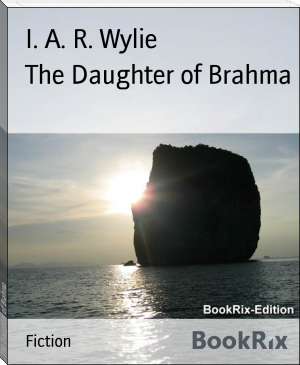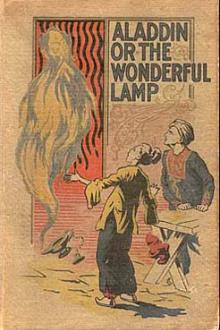The Daughter of Brahma - I. A. R. Wylie (ereader iphone .TXT) 📗

- Author: I. A. R. Wylie
Book online «The Daughter of Brahma - I. A. R. Wylie (ereader iphone .TXT) 📗». Author I. A. R. Wylie
"That's all," he said briefly and not without a touch of truculency.
"Think, David. Remember, we shall all understand if you have, shall we say, exaggerated a little. At night-time one can so easily imagine things, can't one?" He had become ponderously sympathetic; the hearer felt that underneath it all he was saying, "Yes, I too was once a little boy just like you. I understand so well all you are feeling," and David Hurst's face should have lighted up at the condescension of this grown man. Instead, he started as though he had been struck.
"I-- I don't understand what you mean, sir," he answered.
"My dear David, it's just this the story you have told us is very extraordinary. It is so extraordinary that I and I feel that I confess the opinion of those others who have listened to it hardly know whether I can be sure of its entire correctness. I do not want to hurt your feelings, little friend. We all know what it is to have dreams and nightmares and how they cling to us as realities."
He was being very kind, very tactful, but David Hurst had taken a stumbling step forward. He was not looking any more at the clergyman, but at his mother. His eyes were fixed on her face with fear and total bewilderment.
"Mother!" he said, "does he mean that he-- that you don't believe me?"
He spoke quite quietly and very slowly, choosing his words. Mrs. Hurst looked at him without the slightest change of expression.
"You had better go and wash your face and get some breakfast, David," she said. "After so many excitements you will be hungry."
"Mother!" the cry began in violent protest, ended in pathetic despair.
David's eyes wandered round the room: they had become perfectly vacant and rather stupid-looking, and he made a little, uncertain movement with his hands as though he were groping for support. The judge remembered Mrs. Hurst's description and stared out of the window. He was feeling absurdly, grotesquely miserable.
"You had better go, David," Mrs. Hurst repeated.
The boy turned and limped towards the door. Fatigue made his infirmity painfully apparent, and his mother's eyes never left him. On his way he passed quite close to the judge and nearly fell over that gentleman's outstretched legs. A kindly hand was held out to catch him.
"Now then, young man, you'll be breaking your neck next! And, look here, don't wolf your breakfast. I'm coming out to see you eat it and have a chat with you. As too compris, as our French friends say?"
David smiled faintly at the judge's time-honoured effort at facetiousness. Then he gently disengaged himself, and they heard his unequal, lagging step on the corridor outside. An uncomfortable pause followed his dismissal. The three men felt ill at ease in the face of Mrs. Hurst's impassibility; she upset all their masculine ideas of what a woman should be under like circumstances. During that anxious night she had neither cried nor shown any alarm; she had taken an active part in the search, spending five hours in the saddle, and it was she who had eventually found David and his protege some few miles across the plain. She had picked him up with an unexpected and unfeminine strength and had ridden home with him, Captain Chichester and the half-unconscious native boy bringing up the rear. Afterwards she had listened to David's story as a judge might have listened, the three men playing the part of a more or less intelligent jury, and, though they were all equally clear that David was romancing, they would have preferred it had his mother either believed or punished him. Her total lack of feeling was uncanny; it caused Mr. Eliot to lose something of his self-confidence, and, contrary to his custom, he left it to some one else to break the silence. But the judge was plunged deep in his own thoughts, and Captain Chichester had never been known to open his mouth except when forced to do so, so that the task fell to Mrs. Hurst herself.
"I have to thank you all three," she said quietly. "You have been most good in your endeavours to find my son. I am really grateful."
It was a formal little speech, which called forth a bow from the captain and an inclination of the head from Mr. Eliot. The judge looked at her and thought he had never seen her so extraordinarily beautiful. She was still in her white riding-habit, but her face bore no trace of the recent exertion; she might just have come out of her room, and the judge became uncomfortably conscious of his own dishevelled appearance. She saw him look woefully at his boots, and smiled with so much humour that the judge, who caught the change, felt a veil had been lifted behind which lay endless possibilities. He got up, tempted to make an appeal against his own judgment.
"We ought to be off and let you rest," he said, "but before I go I should like to be a little clearer about this business. I know David's account is improbable, but is it impossible? Surely there is evidence enough to speak in his favour. The temple undoubtedly exists; there is the boy whom he said he rescued, with a nasty cut in the arm to back the story up. Queer and ugly things happen in India things we Europeans never get to see, although we pretend to see everything. As a matter of fact, we never have, and never shall, get to the bottom of the country we govern, and so we can always expect to have our theories upset."
Mr. Eliot waved his arm. He was in his element.
"My dear Judge," he said, "I can quite understand your desire to see David's account in the most favourable light; but, if I may venture to say so, you have not had my opportunities of testing the matter. As you know, I am deeply interested in the customs of the people whose spiritual welfare I have so much at heart, and I can assure you that, according to my investigation, the practices which he says he witnessed are absolutely extinct, thanks to the progress of Christianity. Moreover, I happen to know the temple where these scenes are supposed to have taken place. There is a small building in it, answering to David's description, but it is far too small to accommodate more than half a dozen persons. The idea of it containing crowds of dancers, let alone a big idol, is absurd."
"But the boy--" the judge broke in impatiently.
Mr. Eliot sniffed. It was an unconscious mannerism of his which could be intensely irritating, but he had, as he himself said, risen from the ranks, and the habits of his kind had risen with him.
"Ah, the boy is indeed a problem," he admitted. "No doubt he had been mishandled before David found him--he may even have given the idea of the sacrifice--these Hindus are born liars. But I shall find out, and, in the meantime, unless the parents show themselves, I shall take the boy into my mission home, and make a good Christian out of him. It is an untold joy to me to receive another lamb into the flock--"
Mrs. Hurst got up so suddenly that Mr. Eliot forgot the end of his sentence. Her face expressed a curious mixture of amusement and annoyance.
"You are perfectly right, Mr. Eliot," she said. "Though I appreciate the judge's efforts to vindicate David, I confess I have not the slightest doubt that David has yielded to the temptation to make a hero of himself. Unfortunately, he is not cast in the heroic mould. And now you must come to tiffin. You must all be desperately hungry."
Neither the judge nor Captain Chichester had had the slightest intention of remaining, but they followed her obediently out of the room, Mr. Eliot bringing up the rear. No sooner had the curtains fallen in their place than a big arm-chair by the window was pushed violently on one side, a fair, dishevelled head made its appearance above the top, and a very flushed face distorted itself into a fearful grimace, evidently intended for the reverend gentleman's back. Then Diana Chichester made her full appearance, and ran out on to the verandah.
"David!" she called.
He was not to be seen, but, having escaped the vigilance of her ayah and walked the whole way from the station, in order to take her share in the excitement, she was not now to be baulked. Eventually, she found the object of her search at the front of the bungalow, leaning with his elbows on the verandah rail.
"David," she repeated, and shook him by the arm. He did not turn or look at her.
"What is it?" he asked indistinctly.
"I've been hunting everywhere for you. I want to talk to you. I came over first thing this morning, and when I saw them all coming back, I hid. I knew they'd send me home, or something. So I heard everything. David, that was a fine story you told. I didn't know you could tell stories like that. I'd have come oftener to play with you if I had known. But, David, what did you really do?"
He remained silent, and she put her head forward, trying to catch a glimpse of his averted face.
"You might have known they wouldn't have swallowed it," she went on, determined not to let the conversation drop. "Mr. Eliot noses out a tarradiddle at once -- it's a bad sign, I think, when people always find out other people. Anyhow, he's gloating over your little nigger-boy like I did that day I caught that big beetle do you remember? He's looking to take him into his school, and make a good Christian out of him. Won't the little beggar squirm--"
David Hurst swung round suddenly.
"Mr. Eliot's not to have him," he said. "He's mine --I saved him--"
"You saved him? But they don't believe you-- nobody does. And Mr. Eliot's got hold of him and won't let him go. Why--" she stopped short and her tone changed "--you didn't expect them to believe, did you?"
A spasm passed over his face. His lips quivered, but no sound came forth.
"David!" she exclaimed. "It wasn't true!" She stood staring at him, adjusting herself to this amazing point of view with feminine quickness. The light-hearted excitement had died out of her face: very dimly she realised that here was something which she had not hitherto known -- suffering.
"David," she said slowly, "if you tell me it was all true on your word of honour I'll believe you. I promise you I will. And I'll make father believe you." She held out her hand. "You've only got to say."
He did not take her hand. For one moment she thought he was going to strike it aside. His features were livid and convulsed, his nostrils distended. He controlled himself at last, but his eyes horrified her with their violent misery.
"I shan't say," he burst out passionately. "I shan't ever say-- not to you-- not to anybody. I don't care whether you believe, or or what happens. It's all no good now."
His voice broke. He turned from her and stumbled down the steps, too blind to know where he was going, too sick with pain to





Comments (0)